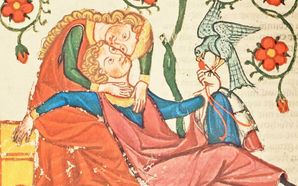Literature
Literature is a mirror of society, which was just as true during the Middle Ages as it is today. Thankfully, there is a wealth of medieval manuscripts that fall in the wide parameters of medieval literature. These range between topics both religious and secular and include stories of love and bravery, stories of a moralizing or allegorical nature, historic chronicles, myths, fables, and travelogues. It was also during the Middle Ages that some of the first female authors in all of world literature began to emerge, some of whom like Christine de Pizan even dared to subvert medieval morality and concepts of womanhood, or made valuable contributions to the sciences.
Medieval readers were looking for stories that would take them out of their small everyday livesand take them into a world of the exotic, such as Troy, or at least into a world full of excitement and adventure. They also needed moral-didactic stories that would enrich their lives and inspire them to live virtuously. Some of these stories were based on classical myths or on the pagan oral tradition of the north and therefore had to be reconciled with the Christian moral concept. Others were mythologized retellings of real events, with real facts readily subordinated for the sake of a good and entertaining story.
Medieval literature is a vast genre that is as diverse and varied as medieval Europe itself, and upon exploring it, one is amazed at how many modern stories are built on this tradition – often unwittingly. More importantly, medieval literature allows us to increase our understanding of people’s lives and mindsets in the Middle Ages and to examine our own roots in this distant past.
Demonstration of a Sample Page

King René’s Book of Love
René’s Heart is Stolen
Renè d’Anjou experienced the highs and lows of life and love while striving to embody the chivalric ideal by throwing lavish banquets and tournaments. He was also an author, which was rare among the medieval nobility. His allegorical chivalric romance Le Livre du Cuer d'amours espris was inspired by the loss of his dearly-beloved wife Isabella in 1453.
The story begins when René’s heart, personified by the knight Cuer, is stolen by cupid and given over to desire. Awaking from this dream, René checked his side and called for his valet to bring him pen and paper so he might record it. The Early Netherlandish master Barthélemy d'Eyck was able to capture the bitter-sweet nature of the text with some of the finest medieval illumination ever created.






